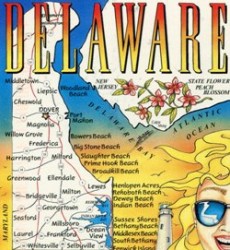Delaware Online Gambling Reports 7% Rise In June

The state of Delaware‘s latest online gambling results were a mixed bag, and while online casino games enjoyed a bumper June, online poker suffered its worst ever month with revenues lower than even the most pessimistic analyst could have predicted. Overall, though, The Diamond State generated $187,944 in revenues, up 7% compared to the $175,410 collected in May.
Casino games up a massive 124%
From the $187,944 generated by the state’s three iGaming sites in June, $162,337 was derived from online casino games, or 86% of total online gambling revenues. This figure also represents a massive 124% surge in growth compared to the $72,537 taken in May.
Once again casino games and not poker are providing the growth potential for the state’s nascent iGaming industry, and its positive results were further enhanced by an increase in the number of player sign-ups in June, which added another 399 new accounts last month, up from 342 the previous month. June’s uptick in signups was also the first monthly increase since Delaware launched its first gambling site back in November 2013.
Poker a major disappointment
On the other hand, online poker revenues dropped so low that one wonders whether there remains much room for the business to fall further. During the month, poker revenues plummeted by 55% to a mere $25,607, down from the $57,470 generated in May. The result was even more surprising considering at the time May’s tally was the lowest ever recorded by the state’s online poker market.
Last month, Delaware’s online poker market continued to be lead by Delaware Park which maintained its 62% share of revenues worth $15,899, followed by Dover Downs ($7,586) which dropped 2 points to 30%, and Harrington Gaming ($2,121) up 2 point to 8%.
Part of June’s contraction can be attributed to a typical seasonal decline, as well as the 2014 World Series of Poker in Las Vegas which this year enjoyed a record-breaking field of 82,360 players, up 3.6% over 2013’s tally of 79,471 participants. Although enthusiasts from 107 different countries attended the Series, the USA accounted for 78,165 of the players, a 21,125 rise year-over-year.
Poker in a downswing
In spite of seasonal factors and the WSOP, online poker has been on a downswing over the last few months, a trend which has been noted all across global online poker markets since Black-Friday. A glimpse into Delaware’s online poker figures since inception will give a clearer picture into the challenges now facing the state:
November 2013: $67,928
December 2013: $106,922
January 2014: $88,588
February 2014: $74,399
March 2014: $84,476
April 2014: $74,153
May 2014: $57,468
June 2014: $25,607
At a time when online poker organizations, such as the Poker Players Alliance (PPA), have been lobbying for regulation stateside the latest tranche of results will hardly help to stimulate interest in the game and motivate other states to join Nevada, Delaware and New Jersey in offering online poker. In the past, highly optimistic forecasts helped generate interest in online poker legislation from cash-strapped states, but reality has thus far not lived up to expectations. Casing point, New Jersey’s initial prediction of $1 billion in annual revenues and $180 million in taxes has proven to be but a tenth of that figure.
This fact even moved Poker Players Alliance Executive Director John Pappas to state recently that “We need to be realistic when talking to lawmakers about what can be expected from iPoker revenue, particularly when looking at a state-by-state deal where individual states are operating. Until they can have interstate liquidity, I think they will always have lower-than-expected revenues.”
Intra state compact Delaware’s only hope
Online poker’s recent decline in Delaware makes the need for the state to enact its interstate compact with Nevada all the more pressing. The compact is already in place, but the states will have to go some if they are to keep to their stated goal of a shared online poker pool by the end of summer.
Even then Nevada and Delaware could do with attracting other US states to adopt regulation and join their network, with Nevada Governor Brian Sandoval, offering to help those states set up the necessary infrastructure. As Sandoval explained:
“If there are states that don’t have as sophisticated a regulatory structure as we have, that’s something we can offer. If your state doesn’t have the infrastructure, use our capabilities.”







